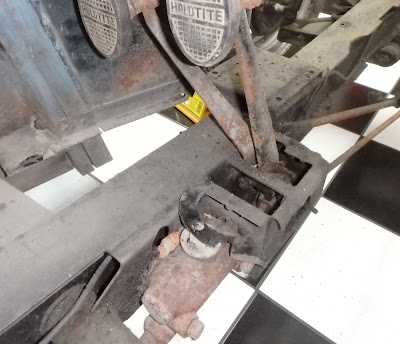PROJECT 51: Master brake cylinder. To be filed under
"Hope springs eternal," shortly after I bought the MG, back in late
October of last year, I added a "Master Cylinder Rebuild Kit" to my
Christmas list (along with many other MG items), and Santa didn't disappoint
me.
The master cylinder is the small hydraulic pump that is
connected to the brake pedal that forces the brake fluid through all of the
steel lines out to the wheel cylinders to expand the brake shoes against the
drums to make the car stop … so it's kind of important that it works right.
I finally got around to cleaning and disassembling the master
cylinder assembly, and based on what I've learned about the REAL condition of
the car since those early optimistic (blissfully naïve) days, I wasn't the
least bit surprised to find that Santa had wasted the precious room in his
sleigh on THAT gift.
My first clue that something might be wrong was when I had
to extract the pushrod with a pair of Vice Grips. That part should normally
just fall out when its rubber dust boot is removed. The rusty brake fluid that
ran out when I removed the piston pretty much told me the rest of the story.
Although not as bad as I thought it would be, the cylinder
bore had several spots of deep rust pitting.
When the brake pedal is pressed and the rubber piston seal
passes over one of those pitted areas, the brake fluid leaks behind the seal,
rather than getting pumped out to the brakes, causing a "soft pedal."
That's if you're lucky. If the pitting and leakage is bad enough, the pedal
goes right to the floor, and your life begins to flash in front of your eyes.
(Been there; seen that; changed underwear!)
A complete new master cylinder is on its way. There will
still be plenty of other things for Santa to bring me later on.
 |
| Master cylinder still in car. |
 |
| Rusty brake fluid is not a good sign! |
 |
| Brown crescents inside bore are rust pits. |
 |
| On its way, now. Can't wait for Santa. |
No comments:
Post a Comment